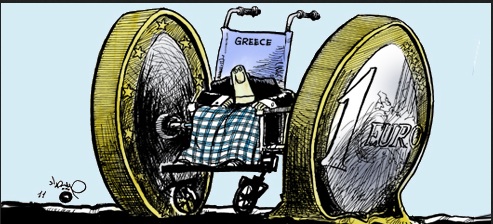High quality global journalism requires investment. Please share this article with others using the link below, do not cut & paste the article. See our Ts&Cs and Copyright Policy for more detail. Email ftsales.support@ft.com to buy additional rights. http://www.ft.com/cms/s/2/8b960548-143b-11e5-9bc5-00144feabdc0.html#ixzz3eLevbuxS
June 29: Recalling the Bundestag
The primary reason a deal must be concluded by June 25 is so there is enough time for eurozone parliaments to approve an extension of the existing bailout programme.
Jeroen Dijsselbloem, the Dutch finance minister who heads the negotiations for his 17 eurozone counterparts, has said there is simply no longer time for Greece to legislate and pass all the “prior actions” needed to win bailout money before the rescue programme runs out at the end of the month. So it will have to be extended for a third time in seven months.
Under national laws, any extension must be approved by a handful of eurozone parliaments — most importantly the German Bundestag, which is due to be on recess next week. Although the centre-right bloc of Chancellor Angela Merkel has become increasingly restless over Greece, they are likely to back any extension she endorses — even if they have to return from holiday to do so. But the vote must be held either the 29th or 30th, giving legislators precious little time to review the agreement.
June 30: Expiration date
The date Greece’s bailout expires and when it is due to repay €1.5bn in loan repayments to the International Monetary Fund. Even if a deal is in place before the deadline expires, it remains unclear how — or whether — Greece will find the money to pay the IMF, since there is not enough time for Athens to pass all the economic reforms necessary to gain access to any of the €7.2bn in bailout funds.
One option to quickly raise funds would be for the ECB to lift its existing cap on the amount of short-term debt the Greek government can issue by about €2bn. This would enable Athens to quickly raise cash to make the IMF payment.
The ECB imposed the cap in February because of signs Greek banks were the only buyers of such Treasury bills. Because Greek banks are only staying open through ECB-approved emergency loans, increasing the t-bill cap would essentially mean central bank money was being used to fund the Greek state — a violation of EU law.
But the ECB could decide that an agreement on a new economic reform plan means that new money, in the form of bailout aid, is on its way to Athens, meaning T-bill sales to Greek banks are not directly funding government operations. That would allow them to raise the cap.
It is also possible Athens just misses the payment. Although technically this is not a default, since IMF rules consider a non-payment “arrears”, Greece would join a motley crew of developing countries — Somalia, Cuba and Zimbabwe — that have current or former “overdue obligations” to the IMF.
But credit rating agencies have said that non-payment to the IMF is not formally a default, and the ECB is unlikely to decide it means Greece is bankrupt. If it did, much of the collateral used by Greek banks to obtain their emergency loans — particularly Greek government bonds — would be worthless. That would mean the ECB having to cut off emergency funding, probably forcing a Grexit.
July 1: The extended bailout
If a deal is reached and all the legislative approvals are voted in time, Greece’s bailout would be extended for anywhere from three to nine months. For the EU’s portion of the bailout, the extension is expected to include a bit more money as well.
Of the €7.2bn in the current bailout tranche, the eurozone is due to contribute about half (the other half would come from the IMF). On top of that, €10.9bn in rescue funds that had been set aside to recapitalise Greece’s banks remains unused and eurozone leaders are likely to approve a “repurposing” of those funds as general bailout aid.
In addition, another €1.5bn in profits on Greek bonds held by the ECB — which are to be refunded to Athens as part of a deal reached three years ago — come online July 1. All told, that’s about €16bn in EU aid available to Athens as part of the extension. The length of the extension will depend largely on how long officials determine that money can last.
There is also about €16.4bn remaining in the IMF’s portion of the bailout, which runs through March 2016.
July 20: Drop-dead deadline
This may be the real drop-dead deadline: the date two bonds totalling €3.5bn fall due to the ECB.
Although credit rating agency Standard & Poor’s said recently it would not consider a failure to pay these bonds a full default — it said only non-payment on bonds held by private creditors constitutes a default in their books — it would be virtually impossible for Greece to survive inside the eurozone if it defaulted on the ECB.
That means Greece must legislate for and implement the entire reform programme before this date so that it ensures it has bailout funding in time to repay the ECB. Another €3.2bn is due for two more bonds held by the ECB on August 20.
Courtesy Financial Times










